The Electronic Intifada 4 June 2014

Members of the Palestinian national security forces carry the bodies of Nadim Siam Nuwara and Muhammad Abu al-Thahir during their funeral procession in the West Bank city of Ramallah, 16 May. The unarmed teens were shot dead by Israeli forces the previous day outside the Ofer military prison following a protest in support of political prisoners and to mark the Nakba or catastrophe of the State of Israel’s creation on ethnically-cleansed Palestine.
ActiveStillsDuring the month of May, Israeli forces in the occupied West Bank fatally shot two unarmed Palestinian teens in Beitunia village near Ramallah. Surveillance footage from the scene shows Nadim Nuwara and Muhammad Abu al-Thahir being shot down about an hour apart without provocation on 15 May in an incident which the spokesperson for the UN Office of the High Commissioner for Human Rights stated “may amount to extrajudicial executions.”
Nuwara and Abu al-Thahir had participated in a protest in solidarity with hunger-striking Palestinian prisoners in Israeli jails earlier in the day at the site where they were killed; the demonstration also marked Nakba Day, the annual commemoration of the 1948 ethnic cleansing of Palestine by Zionist forces.
Meanwhile in the occupied West Bank, more than a hundred people were displaced after their homes were destroyed by Israeli forces to make way for military trainings in the Jordan Valley, according to UN reporting.
The Gaza Strip remained under a tight siege that has been imposed by Israel and enforced by Egypt for several years; as of 26 May the UN reported that at least 10,000 people were waiting to pass the Rafah crossing into Egypt — the sole entry and exit point for the vast majority of Gaza’s nearly 1.7 million residents — including medical patients, students and holders of visas to third countries. Rafah crossing was open for only a few days during May, mainly for religious pilgrims.
Several Palestinian civilians were shot and injured by Israeli forces in the so-called buffer zone inside Gaza along the boundary with present-day Israel. The victims include a teenage boy who was collecting hay for animals approximately 400 meters from the boundary fence when he was shot in the back, resulting in a permanent disability, according to the UN. As of 26 May, 152 Palestinians had been injured by Israeli forces in Gaza since the beginning of the year.
The chronic fuel shortage forced most of Gaza’s 180 fuel stations to either close or limit operations to a few hours a day. The UN stated that “the increased shortages could be attributed to the closures of the Kerem Shalom crossing on the occasion of Israeli holidays (Passover, Remembrance Day and Independence Day), as well as to coordination issues between the Palestinian authorities in Gaza and Ramallah.”
Gaza’s power plant was operating at half of its working capacity due to a shortage of funding needed for the purchase of fuel, the UN reported mid-month. Since December the power plant has operated using fuel donated by Qatar, which is expected to run out by early July. The power plant’s reduced capacity has resulted in power cuts of up to 12 hours per day, “forcing people to rely on unsafe methods to light their houses,” the UN added; the human rights group Al-Mezan has recorded the deaths of 18 persons, including 16 children, in electricity-related incidents like house fires caused by candles lit during power cuts.
The situation for Palestinian refugees in Syria remained dire during the month of May; food distribution in besieged Yarmouk camp near Damascus was halted on 13 May after sniper fire killed two government personnel in the camp. Prior to that date, the UN agency for Palestine refugees, UNRWA, estimates that less that 25 percent of the minimum food needs of the approximately 18,000 civilians trapped in the camp have been met since January.
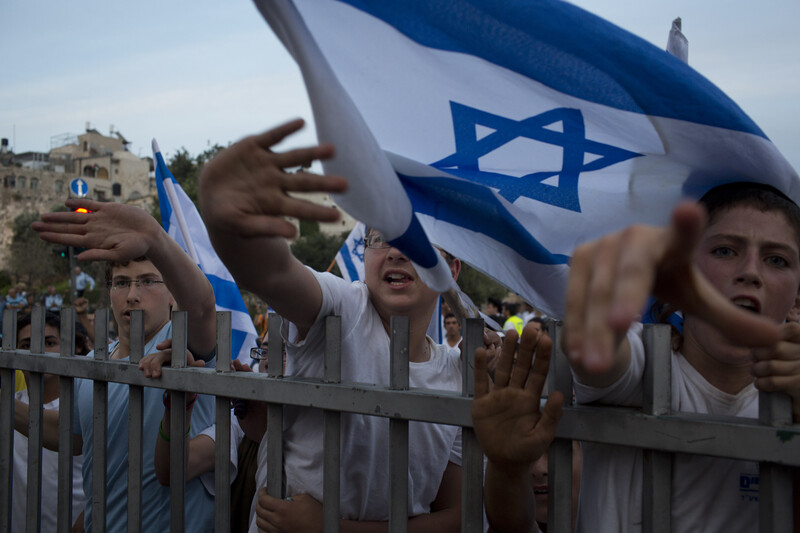
Israeli settlers and ultra-nationalists take part in the “Flag March” through Damascus Gate in eastern occupied Jerusalem on 28 May. The march was part of Jerusalem Day, which commemorates Israel seizing the Old City during the 1967 War. Police prevented Palestinians from gathering and protesting against the march and attacked journalists covering the event.
ActiveStills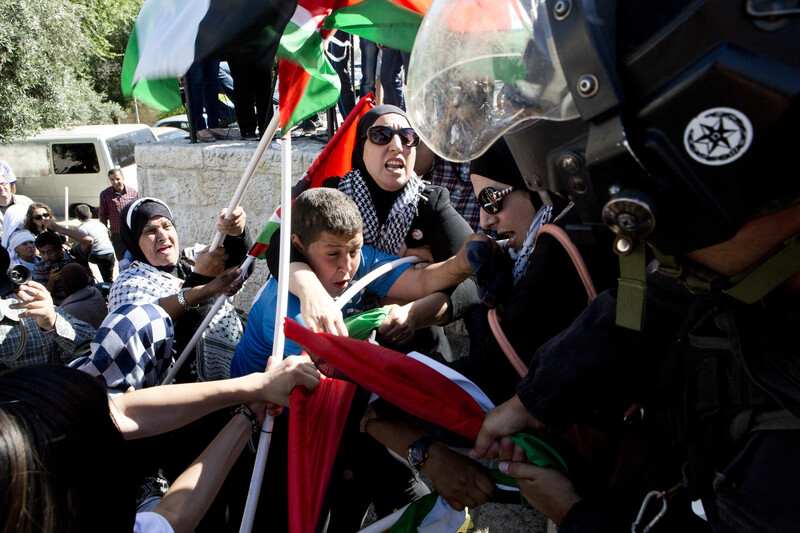
Israeli police push demonstrators during a protest commemorating the Nakba at Damascus Gate outside Jerusalem’s Old City, 15 May.
ActiveStills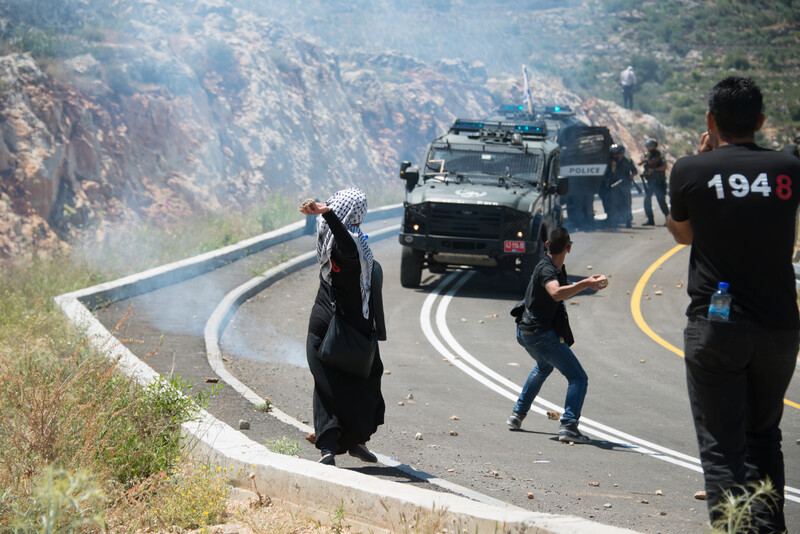
Palestinians throw stones at Israeli forces on the path of Israel’s wall under construction on land belonging to the West Bank village of al-Walaja during a Nakba Day protest, 15 May.
ActiveStills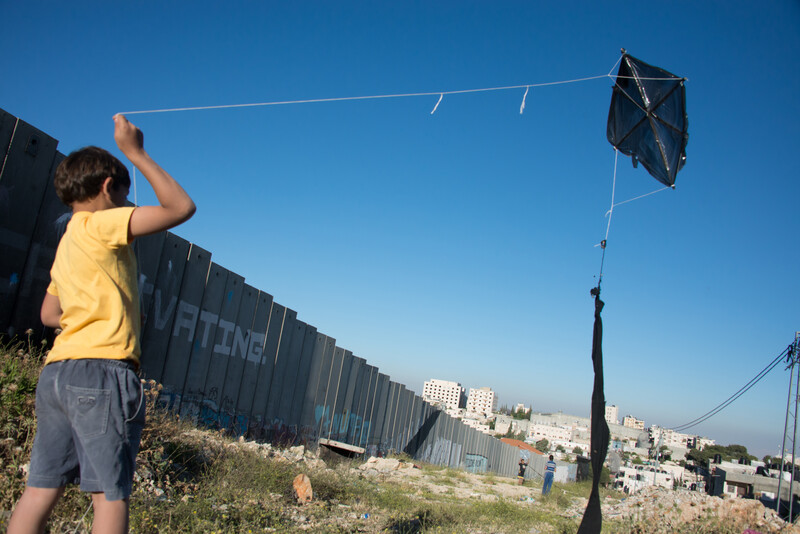
A child from Aida refugee camp near Bethlehem flies a kite over Israel’s wall in the West Bank during a Nakba commemoration event on 14 May.
ActiveStills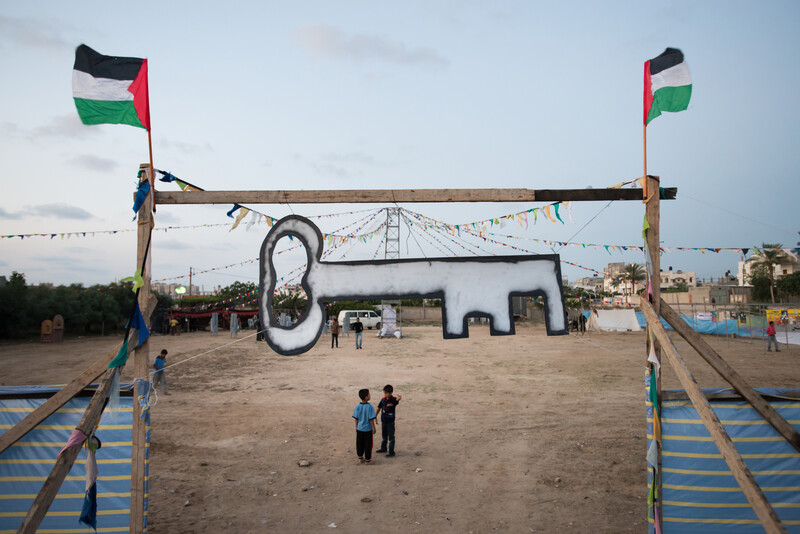
Children stand under the entrance of a Nakba commemoration event in Maghazi refugee camp, Gaza Strip, 11 May.
ActiveStills
Palestinian citizens of Israel take part in the annual March of Return to the village of Lubya in the north of present-day Israel, 6 May. Lubya was destroyed during the 1948 ethnic cleansing when more than 500 Palestinian villages were destroyed before and during Israel’s establishment.
ActiveStills
Right-wing ultranationalists from the Im Tirtzu group protest as Palestinian students living in Israel and allies commemorate the Nakba outside Tel Aviv University, 11 May. The poster reads in Hebrew: “Nakba [is] bullshit.”
ActiveStills
Hebrew University students, faculty and supporters (including Palestinian member of Israel’s parliament, the Knesset, Haneen Zoabi, shown holding sign) in occupied eastern Jerusalem hold a demonstration in solidarity with Palestinian Christian citizens of Israel who were recently sent voluntary draft notices encouraging them to enlist in the Israeli military, 7 May. Though army service will remain voluntary for the vast majority of non-Jewish Israeli citizens, the move is seen as an attempt to drive a wedge between Palestinian Christian and Muslim citizens of Israel.
ActiveStills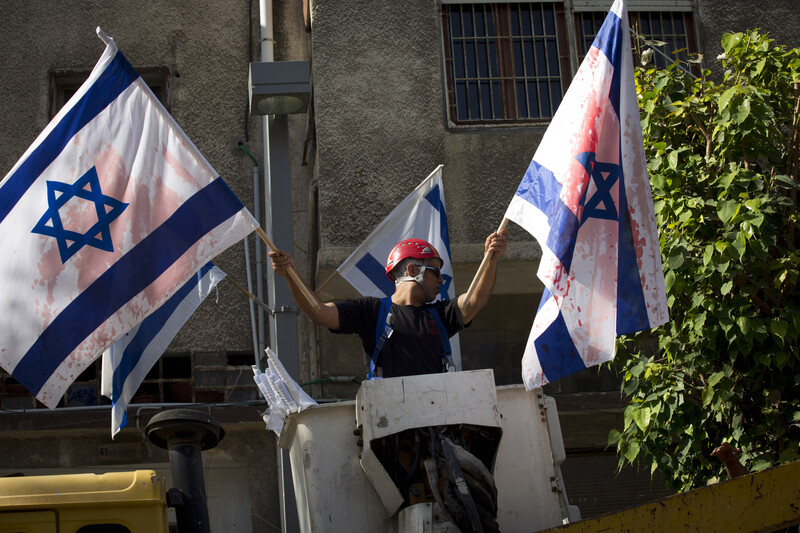
A Tel Aviv municipality worker replaces Israeli flags that were painted red during the night in the city of Jaffa, 1 May. The Tel Aviv municipality hung the flags a week before Israeli independence day.
ActiveStills
During his first Middle East tour since his anointment in 2013, Pope Francis visits the Yad Vashem Holocaust Museum in Jerusalem in the company of Israeli President Shimon Peres and Prime Minister Benjamin Netanyahu (left) on 26 May.
Israeli GPO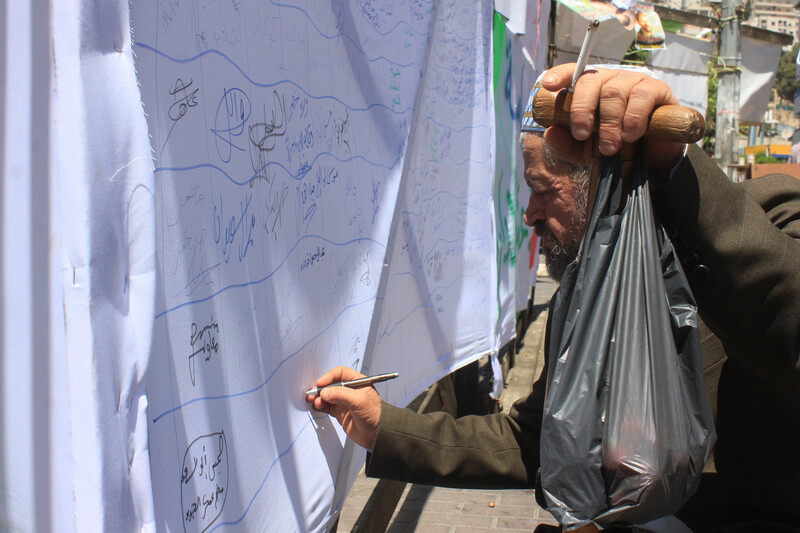
A Palestinian man signs a banner in solidarity with hunger-striking administrative detainees hung beside a protest tent in the city center of Nablus, occupied West Bank, 2 May. More than a hundred Palestinian administrative prisoners in Israeli prisons launched a mass, open-ended hunger strike on 24 April after Israeli authorities reneged on an agreement made following an earlier mass hunger strike to restrict the use of administrative detention to exceptional cases.
ActiveStills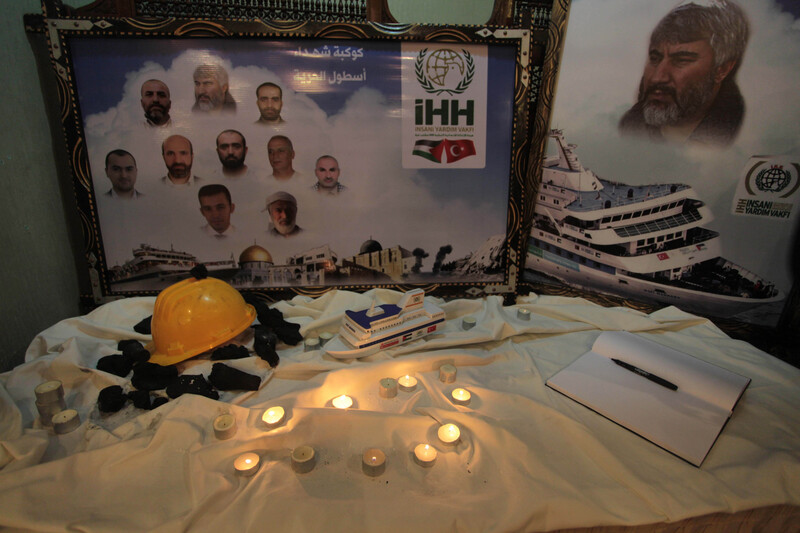
A vigil is displayed in Gaza City in honor of the ten humanitarians slain by Israeli commandos who stormed the Turkish-flagged Mavi Marmara aid ship destined for Gaza in 2010 during a press conference for the Turkish ambassador in Palestine ahead of the fourth anniversary of the attack, 29 May.
APA images
“The place we are living is considered a palace,” Teffaha Hasan, a Palestinian refugee from Syria, said on 22 May. Ten members of her immediate and extended family, from Neirab refugee camp, east of the northern Syrian city of Aleppo, now share a single room in the southern Lebanese city of Tyre. But “the most important thing is that we are safe,” she added.
UNRWA
A Palestinian Bedouin woman sits with her children next to the rubble of her home after it was demolished by Israeli forces in Um Ajaj village north of the West Bank city of Jericho, 21 May. Palestinian security sources said the Israeli military destroyed more than thirty tents and sheds which the army said were illegally built close to the Jewish settlement of Meswah.
APA images
A Palestinian man with his son sits on the rubble of his house after it was demolished by Israeli municipality bulldozers under the pretext that it was built without a permit in the Jabal al-Mukaber district of eastern occupied Jerusalem, 14 May.
APA images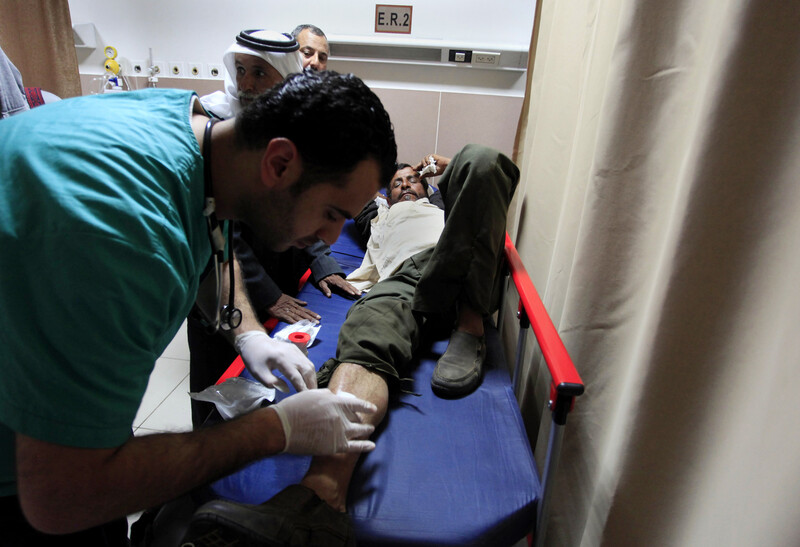
A Palestinian medic treats Suliman Kaabeneh at a hospital in the West Bank city of Ramallah on 13 May. Israeli settlers assaulted and severely beat up the shepherd while he was grazing his sheep near the village of Taybeh, east of Ramallah, according to witnesses.
APA images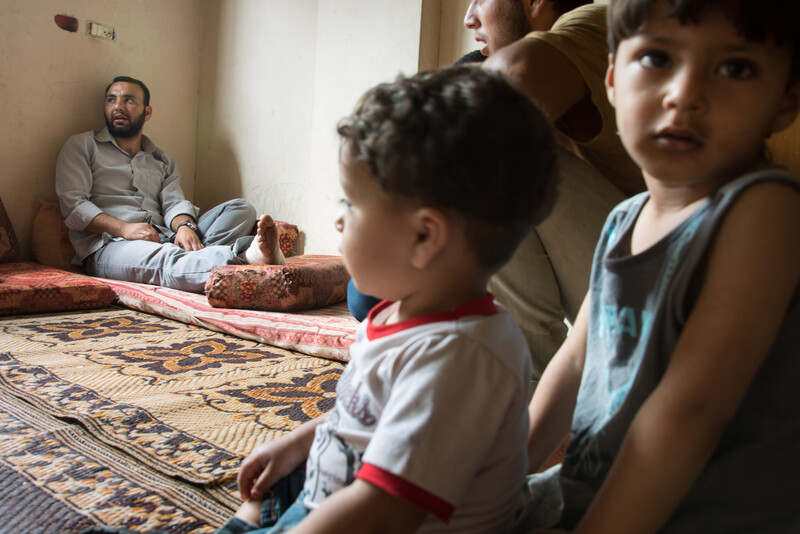
Nizar Alwan recovers in his home in the Gaza village of Jabaliya on 12 May, one day after being shot by Israeli forces near the northern boundary with Israel. Alwan, a father of four, was collecting gravel with six other workers approximately 500 to 600 meters from the boundary when he was shot without warning. He was treated and released from hospital and is expected to make a complete recovery.
ActiveStills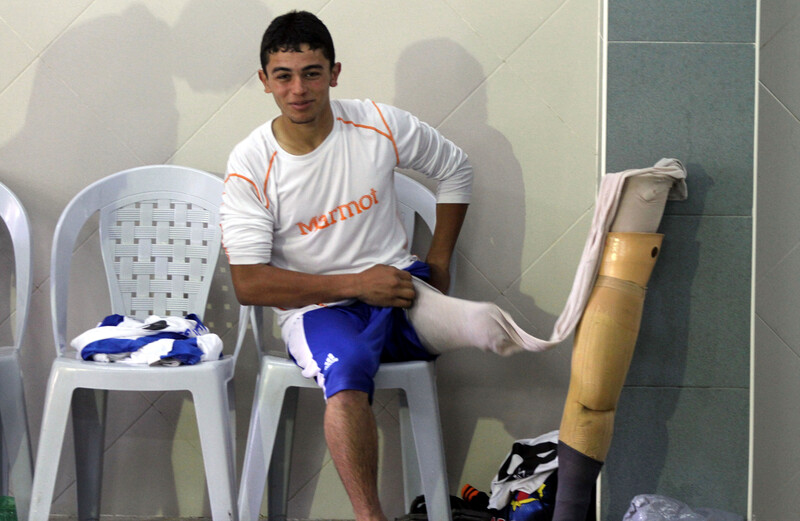
Motasim Abu Karsh, 17, rests after swimming in a pool at a Gaza City club, 18 May. Abu Karsh lost his leg after he was injured during an Israeli air strike in 2005. He won the first place in the freestyle swimming competition that was organized for wounded Palestinians.
APA images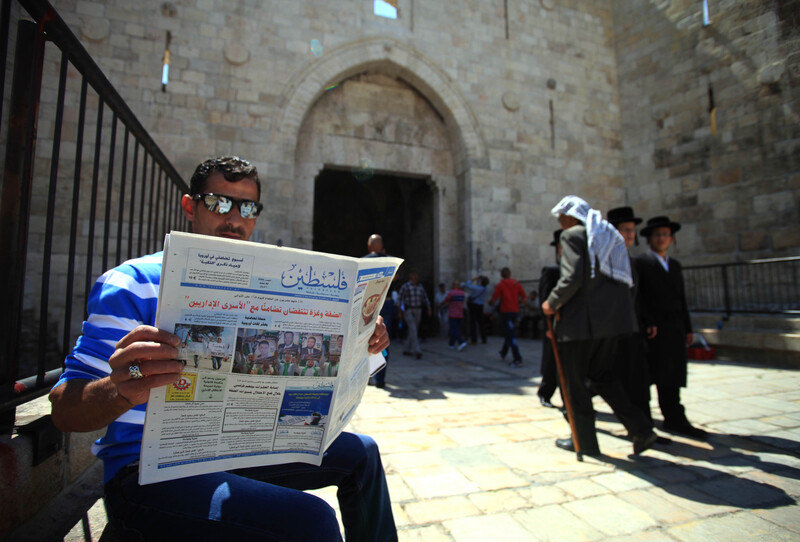
A Palestinian man reads a copy of Palestine newspaper in front of Damascus Gate in Jerusalem’s Old City, 10 May. The Palestinian government in Ramallah allowed the redistribution of the newspaper in the West Bank and Jerusalem, seven years after it was banned in the context of political division.
APA images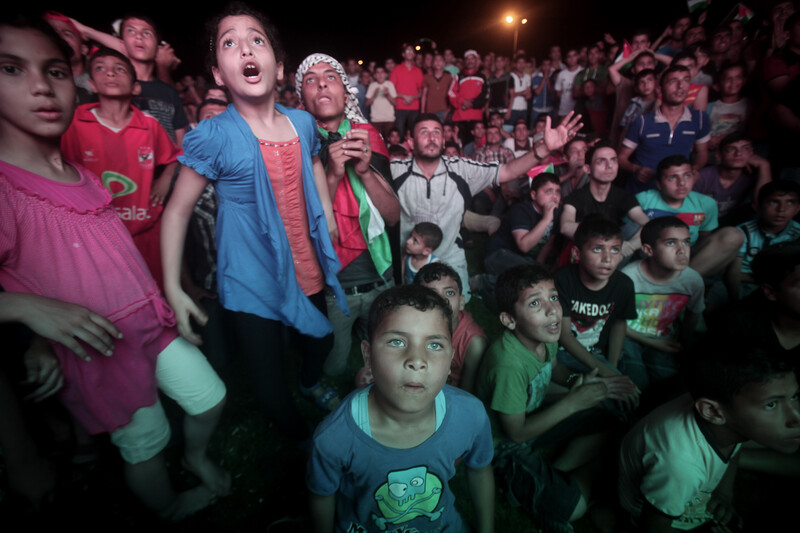
Palestinians in Gaza City celebrate after Palestine qualified for their maiden Asian Cup appearance with a 1-0 win over injury-hit Philippines in the final of the AFC Challenge Cup in Maldives, 30 May.
APA images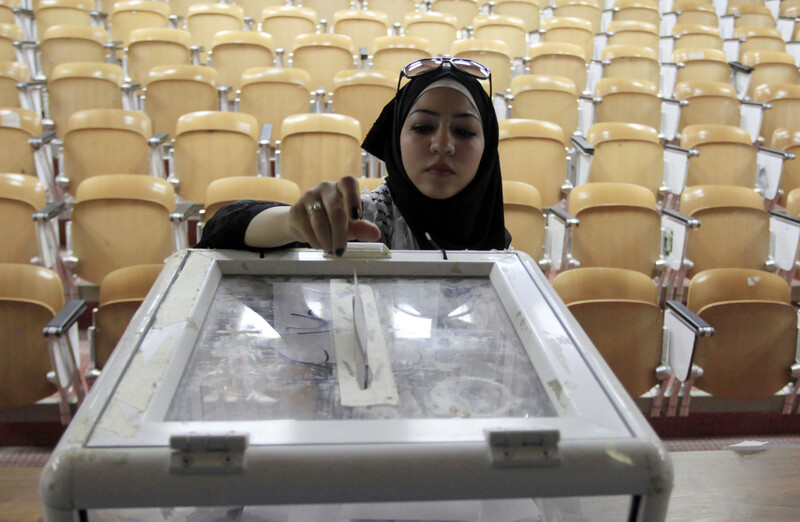
A Palestinian student at Birzeit University near the West Bank city of Ramallah casts her ballot during student council elections, 7 May. The student council elections pitted supporters of the top two political movements, Hamas and Fatah, against one another days after the signing of an intra-Palestinian reconciliation agreement.
APA images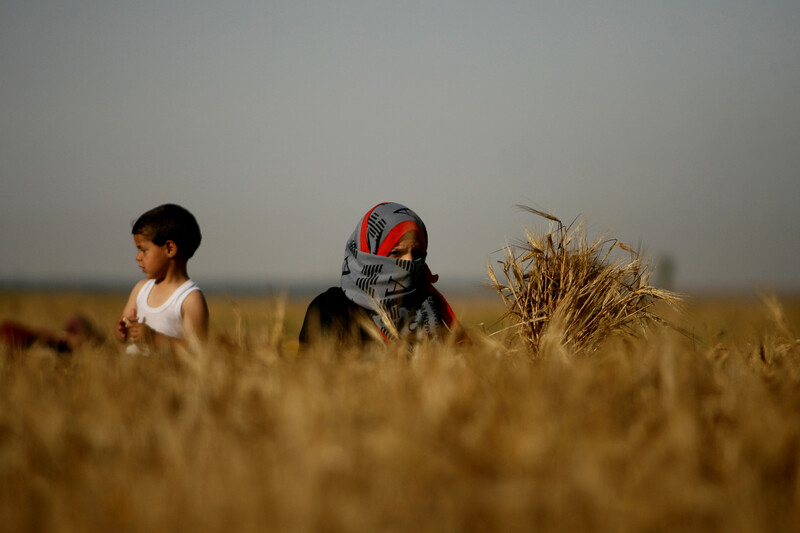
A Palestinian woman harvests wheat on a farm near the southern Gaza Strip city of Khan Younis, 3 May. Hundreds of Palestinian workers depend on the wheat harvest as a source of income in the face of rising unemployment as a result of years of siege.
APA images
A Palestinian girl prays during Friday prayers at the Al-Aqsa mosque compound, Islam’s third holiest site, in the Old City of Jerusalem, 23 May.
APA images
A Palestinian jockey poses with her horse at a club in Gaza City, 10 May.
APA images
Palestinians enjoy the beach on a hot day in Gaza City, 30 May.
APA images

